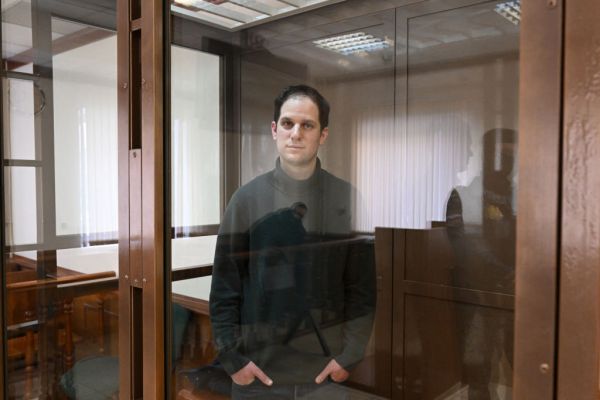Last month, the State Department designated Wall Street Journal reporter Evan Gershkovich as “wrongfully detained” by Russia following his March arrest on bogus charges of espionage—barely three months after the highly controversial prisoner exchange of convicted arms dealer, Viktor Bout, to bring home Brittney Griner from her own wrongful detention.
While the Biden administration has taken a welcome step toward addressing the growing problem of hostile powers taking Americans hostage–the White House hit Russia’s Federal Security Service and a branch of Iran’s Revolutionary Guard with sanctions last week for their role in wrongfully detaining American citizens abroad—the Gershkovich case affords the government an opportunity to use a relatively new foreign policy tool for punishing foreign actors who wrongfully detain Amercans.
In late 2020, Congress passed the Levinson Act, named after former FBI agent Robert Levinson, who is believed to have died while being held hostage by the Islamic Republic of Iran. The law authorizes the president to impose sanctions not just on organizations, but on every individual—from prison guards to heads of state—complicit in holding Americans hostage. While the U.S. deploys sanctions against hostile powers for a number of reasons, it’s the first law tied solely to the seizing of U.S. nationals abroad.
In July 2022, President Biden issued an executive order that authorized Secretary of State Antony Blinken, in consultation with the treasury secretary and the attorney general, to impose asset-blocking and visa-denial sanctions on any individual who is directly or indirectly responsible for or complicit in the wrongful detention of a U.S. national abroad. The executive order put the machine in place to implement the Levinson Act.
The State Department estimated last summer that 40 to 50 Americans are wrongfully detained in foreign countries. The James W. Foley Legacy Foundation, named after the journalist killed by ISIS in 2014, issued a report last September that found a 175 percent increase in such detentions in the last 10 years.
Blinken has an opportunity to impose Levinson Act sanctions on every single individual involved in Gershkovich’s detainment. Blinken will need help, and so the White House should direct the intelligence community to support the State Department in identifying as many individuals as possible who have participated in Mr. Gershkovich’s detainment—from the security forces that seized him to the jailers holding him to the court members arranging sham hearings about him, and especially to the political leadership involved in his capture.
Last week’s sanctions—which were underway before Gershkovich’s detainment—are a starting point, not an end point. Announcing new sanctions on a rolling basis as intelligence becomes available would not just name and shame the individuals involved but would serve as a warning of additional consequences should Gershkovich not be released. Such consequences would be subject to the president’s authorization, but could include cyber operations, information operations, and other active measures.
Gershkovich is hardly alone. The administration should also impose sanctions on individuals responsible for the unlawful detention of former U.S. Marine Paul Whelan, who is being held in Russia, and Siamak Namazi, Morad Tahbaz, and Emad Shargi, who are being held in Iran. It would also be justice for the Levinson family to hold senior members of the Iranian regime accountable for the murder of Robert Levinson—a crime for which the regime has never had to answer.
Congress has a continued role to play in combating hostage-taking, too. The sanctions menu provided in the Levinson Act could be expanded to authorize measures targeting companies or banks that provide services or conduct transactions with such individuals, government ministries, and agencies connected to the hostage taking. Broader economic sanctions targeting countries formally flagged by the State Department as high-risk hostage-taking jurisdictions should also be considered.
State actors today disguise their hostage-taking as lawful arrests, muddying the legal waters. Updating the federal criminal code to explicitly clarify that hostage-taking includes wrongful detentions by state actors could help federal prosecutors bring indictments against anyone involved in snatching American citizens abroad.
Rogue regimes take Americans hostage because they believe they’ll pay no price. The White House and Congress have tools at hand to address this growing problem, and to bring home Gershkovich, Whelan, and other Americans. It’s time for them to use them.
Richard Goldberg, a former National Security Council official, is a senior adviser at the Foundation for Defense of Democracies. Sarah Levinson Moriarty, one of Robert Levinson’s seven children, is a fellow with New America’s International Security Program.







Please note that we at The Dispatch hold ourselves, our work, and our commenters to a higher standard than other places on the internet. We welcome comments that foster genuine debate or discussion—including comments critical of us or our work—but responses that include ad hominem attacks on fellow Dispatch members or are intended to stoke fear and anger may be moderated.